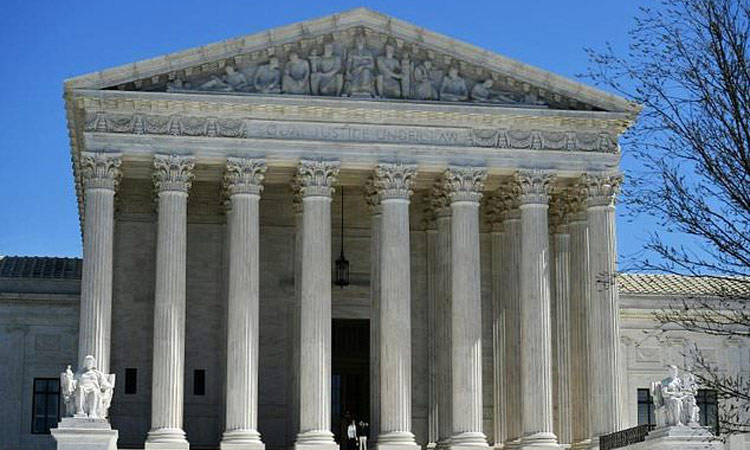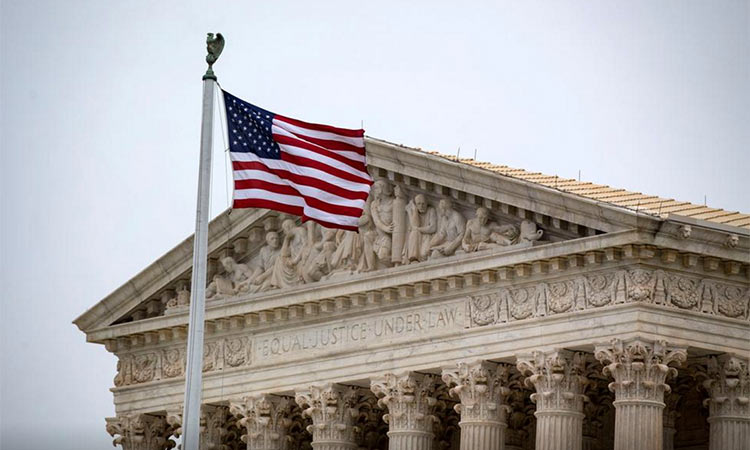A repetitive refrain for the Supreme Court

The building of the US Supreme Court.
Stephen L. Carter, Tribune News Service
With the first Monday in October behind us, perhaps we can at last put to rest the refrain about how the current term of the US Supreme Court is among the most momentous in history. The court’s terms are like presidential elections: always, history has never seen one as important as the one coming up. But the wordsmith in me is aware that the rhetoric we use when discussing the Supreme Court and its work has scarcely changed in more than a century.
In the summer of 1962, for example, the Los Angeles Times wrote that the justices had just ended “their most important term of court in a quarter of a century.” Why a quarter of a century? Maybe because exactly 25 years earlier, in 1937, The Associated Press had declared the year just past to be “one of the most momentous terms” in Supreme Court history.
Pick whatever date you like. In 1950, a Delaware paper warned that with the rights of accused Communists on its docket, the justices were beginning “the most critical term since President Roosevelt introduced his court-packing plan.” In September 1934, with New Deal legislation on the calendar, the New York Herald Tribune announced that this would be “the most important term of the Supreme Court of the United States in generations.” In 1910, with a ruling on the validity of federal antitrust statutes expected, a New Mexico newspaper told readers to prepare for “the most momentous term of the United States supreme court since reconstruction days.”
The way commentators talk about the significance of pending cases is similarly unchanged. “There has never been a more important issue or discussion before that high and powerful tribunal,” wrote the San Francisco Chronicle in 1895, shortly before reargument in Pollock v. Farmers’ Loan and Trust Co., which struck down the federal income tax.
Or, for that matter, decided cases — including cases long forgotten. “When the boys come marching home from the war someday,” wrote a syndicated columnist in 1944, “they will find parts of the Constitution have been emasculated by an irresponsible group of justices.” The dispute to which he referred involved regulation of the insurance business across state lines.
The leftist philosopher and economist Harold Laski warned that the court’s 1935 decision striking down the National Recovery Act “may well be regarded, a generation from now, as its most momentous decision since the Dred Scott case which, 80 years ago, precipitated the American Civil War.” But aside from the fact that the justices swiftly retreated, the Warren Court soon happened, providing plenty of fodder for those at the other end of the spectrum to declare that the sky was falling. Consider the 1964 one-person, one-vote decision, nowadays considered a cornerstone of democracy. “Not all the uneducated are among the high school dropouts and the juvenile delinquents,” huffed the right-leaning columnist Holmes Alexander. “Some are on the Supreme Court.”
There’s not much new under the sun. Everything we dislike about the Supreme Court has been complained about before. Do the Justices snipe at each other? “Rarely has there been so much evidence of personal feuding among the judges,” lamented Jay G. Hayden of the Detroit News in 1942, basing his conclusion on comments in the various written opinions. As the 1982 term of the court began, Fred Barbash of The Washington Post recalled the previous one: “The justices feuded in public, in unfriendly footnotes and in personalised asides and private grumbling that did not stay private very long.”
Do news stories misunderstand the court’s holdings? “Too often such accounts bear little resemblance to the actual opinions of the court,” complained the Minneapolis Tribune in 1959. Is the problem that the justices themselves write poorly? A Brooklyn paper, responding to the Supreme Court’s dreadful 1901 decision in Downes v. Bidwell, wrote that the “mixed and confusing opinion” would not “definitely settle” the “great constitutional question involved.” (Downes, an openly racist decision limiting the rights of inhabitants of US territories other than states, mostly remains hornbook law.)
And so on and so on.







